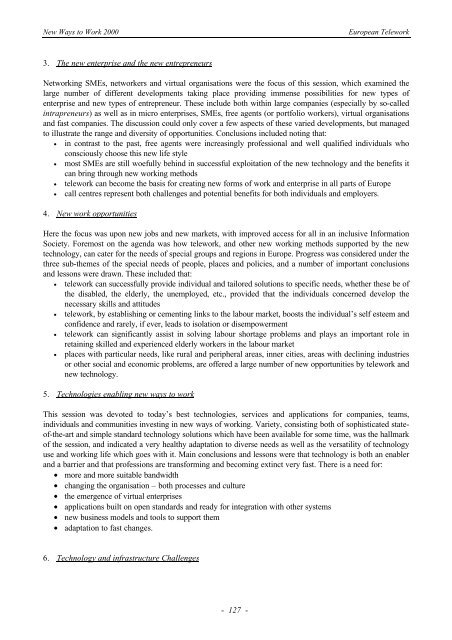eWORK 2000 - European Telework Week
eWORK 2000 - European Telework Week
eWORK 2000 - European Telework Week
- No tags were found...
You also want an ePaper? Increase the reach of your titles
YUMPU automatically turns print PDFs into web optimized ePapers that Google loves.
New Ways to Work <strong>2000</strong><strong>European</strong> <strong>Telework</strong>3. The new enterprise and the new entrepreneursNetworking SMEs, networkers and virtual organisations were the focus of this session, which examined thelarge number of different developments taking place providing immense possibilities for new types ofenterprise and new types of entrepreneur. These include both within large companies (especially by so-calledintrapreneurs) as well as in micro enterprises, SMEs, free agents (or portfolio workers), virtual organisationsand fast companies. The discussion could only cover a few aspects of these varied developments, but managedto illustrate the range and diversity of opportunities. Conclusions included noting that:• in contrast to the past, free agents were increasingly professional and well qualified individuals whoconsciously choose this new life style• most SMEs are still woefully behind in successful exploitation of the new technology and the benefits itcan bring through new working methods• telework can become the basis for creating new forms of work and enterprise in all parts of Europe• call centres represent both challenges and potential benefits for both individuals and employers.4. New work opportunitiesHere the focus was upon new jobs and new markets, with improved access for all in an inclusive InformationSociety. Foremost on the agenda was how telework, and other new working methods supported by the newtechnology, can cater for the needs of special groups and regions in Europe. Progress was considered under thethree sub-themes of the special needs of people, places and policies, and a number of important conclusionsand lessons were drawn. These included that:• telework can successfully provide individual and tailored solutions to specific needs, whether these be ofthe disabled, the elderly, the unemployed, etc., provided that the individuals concerned develop thenecessary skills and attitudes• telework, by establishing or cementing links to the labour market, boosts the individual’s self esteem andconfidence and rarely, if ever, leads to isolation or disempowerment• telework can significantly assist in solving labour shortage problems and plays an important role inretaining skilled and experienced elderly workers in the labour market• places with particular needs, like rural and peripheral areas, inner cities, areas with declining industriesor other social and economic problems, are offered a large number of new opportunities by telework andnew technology.5. Technologies enabling new ways to workThis session was devoted to today’s best technologies, services and applications for companies, teams,individuals and communities investing in new ways of working. Variety, consisting both of sophisticated stateof-the-artand simple standard technology solutions which have been available for some time, was the hallmarkof the session, and indicated a very healthy adaptation to diverse needs as well as the versatility of technologyuse and working life which goes with it. Main conclusions and lessons were that technology is both an enablerand a barrier and that professions are transforming and becoming extinct very fast. There is a need for:• more and more suitable bandwidth• changing the organisation – both processes and culture• the emergence of virtual enterprises• applications built on open standards and ready for integration with other systems• new business models and tools to support them• adaptation to fast changes.6. Technology and infrastructure Challenges- 127 -








